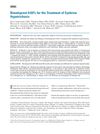 7 citations,
December 2019 in “American Journal of Clinical Dermatology”
7 citations,
December 2019 in “American Journal of Clinical Dermatology” Topical therapies show promise for hair loss and acne treatment with minimal side effects.
 143 citations,
September 1991 in “Archives of Dermatology”
143 citations,
September 1991 in “Archives of Dermatology” Generalized pustular psoriasis patients often need strong medication and careful treatment due to flare-ups and complications.
 4 citations,
May 2020 in “PLOS ONE”
4 citations,
May 2020 in “PLOS ONE” Ingenol mebutate gel changes gene expression related to skin development and immune response in actinic keratosis.
 December 1997 in “Proceedings of SPIE, the International Society for Optical Engineering/Proceedings of SPIE”
December 1997 in “Proceedings of SPIE, the International Society for Optical Engineering/Proceedings of SPIE” Low-energy laser therapy can improve scalp alopecia treatment when combined with classical methods.
 30 citations,
May 2016 in “Expert Opinion on Biological Therapy”
30 citations,
May 2016 in “Expert Opinion on Biological Therapy” New treatments targeting immune pathways show promise for severe hair loss but need more research for safety and effectiveness.
 July 2003 in “Journal of Cutaneous Medicine and Surgery”
July 2003 in “Journal of Cutaneous Medicine and Surgery” Blood pressure drugs can cause skin lupus, but it improves after stopping the drug. The glycoprotein D vaccine works against genital herpes in some women, and the HPV-16 vaccine reduces HPV-16 infection and related diseases. More frequent light therapy clears psoriasis faster. A cream called imiquimod effectively treats a type of skin cancer. Iron supplements don't necessarily help with chronic hair loss in women.
 July 2003 in “Journal of Cutaneous Medicine and Surgery”
July 2003 in “Journal of Cutaneous Medicine and Surgery” Certain drugs can cause lupus, stopping these drugs is the main treatment. NB-UVB phototherapy clears psoriasis faster when applied three times a week. Monoclonal antibodies and oral pimecrolimus are effective in treating psoriasis. Smoking and drinking are linked to psoriasis in men. No direct link between low iron and hair loss was found. Vaccines are effective against genital herpes and human papillomavirus type 16.
 77 citations,
May 2012 in “Expert Opinion on Emerging Drugs”
77 citations,
May 2012 in “Expert Opinion on Emerging Drugs” New treatments for male hypogonadism are effective and should be personalized.
 July 2003 in “Journal of Cutaneous Medicine and Surgery”
July 2003 in “Journal of Cutaneous Medicine and Surgery” Certain drugs can cause skin lupus, but stopping the drug usually helps. Vaccines work against smallpox, genital herpes, and a type of human papillomavirus. More frequent light therapy clears psoriasis faster. Certain treatments work for psoriasis and dermatitis. A specific cream effectively treats a type of skin cancer. Low iron levels aren't directly linked to chronic hair loss.
 320 citations,
December 2018 in “Frontiers in Immunology”
320 citations,
December 2018 in “Frontiers in Immunology” Changing how mesenchymal stromal cells are grown can improve their healing abilities.
 113 citations,
July 2020 in “Communications biology”
113 citations,
July 2020 in “Communications biology” Men, especially older ones with health issues like prostate cancer, may have worse COVID-19 outcomes and could benefit from therapies targeting male hormones.
 45 citations,
January 2020 in “International Journal of Molecular Sciences”
45 citations,
January 2020 in “International Journal of Molecular Sciences” Some natural compounds may help overcome drug resistance in certain cancers, but more research is needed.
 8 citations,
May 2010 in “Dermatologic clinics”
8 citations,
May 2010 in “Dermatologic clinics” New treatments for skin conditions in children include a preferred drug for birthmark reduction, proactive creams for eczema and vitiligo, a safe psoriasis medication, and special tissues and socks for eczema and fungal infections.
 7 citations,
April 2017 in “Dermatologic surgery”
7 citations,
April 2017 in “Dermatologic surgery” Hyaluronic acid fillers and combination treatments significantly improve facial defects from autoimmune diseases and are well-tolerated.
4 citations,
June 2023 in “Frontiers in immunology” JAK inhibitors help hair regrowth in alopecia areata but have a high risk of side effects.
 January 2024 in “International Research Journal of Ayurveda & Yoga”
January 2024 in “International Research Journal of Ayurveda & Yoga” Ayurvedic treatments can effectively regrow hair in alopecia areata.
 June 1996 in “Irish Journal of Medical Science (1971 -)”
June 1996 in “Irish Journal of Medical Science (1971 -)” The document summarizes medical findings on topics like heart rhythm treatment, sleep apnea therapy, and various health conditions and treatments.
 33 citations,
November 2006 in “Survey of Ophthalmology”
33 citations,
November 2006 in “Survey of Ophthalmology” Madarosis is the loss of eyelashes and eyebrows due to various health issues and requires thorough examination to diagnose and treat the underlying cause.
 4 citations,
November 2020 in “Psoriasis : Targets and Therapy”
4 citations,
November 2020 in “Psoriasis : Targets and Therapy” The document concludes that proper treatment and management of plaque psoriasis in adolescents can improve their quality of life.
 1 citations,
October 2013 in “Expert Review of Dermatology”
1 citations,
October 2013 in “Expert Review of Dermatology” Diagnosing alopecia areata is challenging and requires careful examination and various tests to distinguish it from other hair loss types.
 January 2014 in “Side effects of drugs annual”
January 2014 in “Side effects of drugs annual” Exposure to certain sex hormones can increase health risks, while some hormone therapies may offer benefits for specific conditions.
256 citations,
March 2019 in “Journal of the American Academy of Dermatology” There is no standardized treatment for hidradenitis suppurativa, and individualized plans are needed.
 January 2019 in “Springer eBooks”
January 2019 in “Springer eBooks” Acne is linked to inflammation and insulin resistance, and is associated with various syndromes that require different treatments.
 June 2008 in “Springer eBooks”
June 2008 in “Springer eBooks” The document concludes that permanent hair loss conditions are complex, require early specific treatments, and "secondary permanent alopecias" might be a more accurate term than "secondary cicatricial alopecia."
 218 citations,
January 2013 in “The Lancet Oncology”
218 citations,
January 2013 in “The Lancet Oncology” Chemotherapy causes hair loss by damaging hair follicles and stem cells, with more research needed for prevention and treatment.
52 citations,
February 2003 in “Archives of dermatology” 9-cis-retinoic acid showed some effectiveness in treating AIDS-related Kaposi sarcoma but had significant side effects at higher doses.
 May 2023 in “Cytotherapy”
May 2023 in “Cytotherapy” Hair follicle and adipose cell vesicles both protect neurons and reduce inflammation similarly.
August 2024 in “Cosmetics” Peanut callus extract helps grow hair and prevent hair loss.
3 citations,
July 2023 in “International journal of molecular sciences” Stress may contribute to hair loss in alopecia areata by affecting immune responses and cell death in hair follicles.
 3 citations,
February 2023 in “International Journal of Molecular Sciences”
3 citations,
February 2023 in “International Journal of Molecular Sciences” Autologous Platelet and Extracellular Vesicle-Rich Plasma (PVRP) has potential in enhancing tissue regeneration and improving hair conditions, but its effectiveness varies due to individual differences.

























